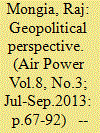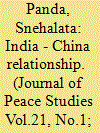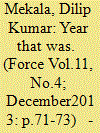| Srl | Item |
| 1 |
ID:
128108


|
|
|
|
|
| Publication |
2013.
|
| Summary/Abstract |
A region in the far reaches of the Himalayas, Tibet looms large in the imagination. It is the original home of the Dalai Lama, one of the great spiritual leaders of our time. Tibetan Buddhism inspires millions worldwide with the twin values of wisdom and compassion. The Chinese takeover of the country six decades ago also shows another side of Tibet- that of a passionate symbol of freedom in the face of political oppression. International sympathy has kept the Dalai Lama's appeals for autonomy of the world's political agenda, but in the light of China's political and economic gains, there is fear that Tibet is in danger of being forgotten by the world. As the Dalai Lama grows older and China threatens to intervene in the selection of Tibet' s next spiritual leader, many wonder whether there is any hope for the cause of Tibet or will it become a casualty of globalization.
|
|
|
|
|
|
|
|
|
|
|
|
|
|
|
|
| 2 |
ID:
129065


|
|
|
|
|
| Publication |
2014.
|
| Summary/Abstract |
Strong commercial ties moving in tandem with threats and competition epitomize China's relation with India. The end of the cold war added a new dimension to their relationship because interests of both the countries converged on economic development. Strategies were innovated to promote this objective. But economic relationship has not created an environment of trust to shield their bonding from misperceptions and competition. Ironically the trust deficit is due to antithetical perceptions emerging from the divergence of their interests cloaked in the very process of engagement activated in the 19905. No doubt efforts to strengthen their relationship were set in motion much earlier, yet the reconfiguration of geo politics after the end of the cold war gave it a new twist. It may be divided into three phases; the take off phase followed by a vigorous competitive stage and a slow growth phase. In all these phases the common link is trade detached from outstanding problems. Simultaneously both compete for resources to fuel their growing economies and enhance their influence. In neither case popular opinion gets reflected in the pursuit of foreign policy but, apparently there is difference in popular perceptions and official policy. The nature of the political system in India being more free than China popular opinion gets reflected in the media. Nevertheless the official
position of both the countries is to maintain peace without giving vent to unremitting problems. In the context of geo politics, the divergence and convergence of their interests may be assessed at four levels.
|
|
|
|
|
|
|
|
|
|
|
|
|
|
|
|
| 3 |
ID:
129708


|
|
|
|
|
| Publication |
2014.
|
| Summary/Abstract |
Gone are the days, when the slogan of 'Indo-China Bhai Bhai- Tanduri Chicken joy joy' was the slogan airing over Himalayan Corridor and showing the world some sort of strategic change in the global politics. Through it started with lot of optimism, expectations from both sides and idealism, however the 'national interest' of both these countries compelled them to drift away from each other. At the same time the geostrategic location of Himalaya and the countries touching its boundary apart from India and China, i.e. Pakistan, Nepal, Bhutan, Tibet are equally responsible for creating hostility between these two neighbors, who are otherwise great powers or potential great players of contemporary world politics. Hence it is prudent to peep into history how it shaped the relationship between these countries and to move forward with considerable amount of consciousness and rationality to safe out position and simultaneously playing an active role in international politics, to being with regional level at least at the South-Asian level.
|
|
|
|
|
|
|
|
|
|
|
|
|
|
|
|
| 4 |
ID:
126007


|
|
|
|
|
| Publication |
2013.
|
| Summary/Abstract |
Another eventful year is coming to an end and this time there is a lot to be cheerful about. For the defence and the paramilitary forces, the year 2013 has been fruitful in terms of their force modernisation. Even the defence industry managed to find satisfaction in some of the advances made in the long and tedious defence procurement.
On the other hand, instances of infiltration, cross border firing and border incursion from neighbouring armies cast a pall of gloom in an otherwise successful year. In addition, there were tragic and extremely challenging situations which the government and the forces faced, such as the devastating floods in Uttarakhand, INS Sindhurakshak mishap and so on. But overall, it has been an eventful year. Let's look at the major events in Indian defence in 2013.
|
|
|
|
|
|
|
|
|
|
|
|
|
|
|
|